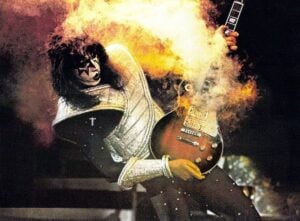5 Rock Songs from 1971 That Changed the Course of Music History

via Rock Mania / YouTube
Every year in popular music has its significance, as genres continually evolve. Even in years that seem less monumental, musicians are often creating, recording, or drawing inspiration from the past, which shapes future releases. However, certain years in rock music stand out for producing defining releases that either summarize the genre’s achievements or push it in bold new directions.
Many critics consider 1971 one of those pivotal years, with a wave of influential tracks hitting the shelves and reshaping rock. By then, the U.S. music scene had been heavily influenced by the “British Invasion,” elevating U.K. bands to top positions. The Rolling Stones remained prominent with hits like “Brown Sugar,” while Led Zeppelin expanded rock’s scale with epic tracks such as “Stairway to Heaven.”
Beyond these classics, other 1971 releases also left a lasting impact.
The Who – “Baba O’Riley”
Following the success of their 1969 rock opera Tommy, The Who aimed to build on that momentum. After shelving their ambitious Life House project, Pete Townshend turned to themes inspired by Indian mysticism and Meher Baba, while also drawing on avant-garde composer Terry Riley. Using a synthesizer—which was still new at the time—Townshend created the iconic sound of “Baba O’Riley,” blending conceptual artistry with mainstream appeal and paving the way for experimental rock in the 1970s and beyond.
Black Sabbath – “Children of the Grave”
Black Sabbath had already shaken the music world with Paranoid in 1970, shaping heavy metal and the darker aesthetic in rock. On Master of Reality, guitarist Tony Iommi’s use of down-tuned guitars—partly due to a hand injury—produced an even heavier sound. “Children of the Grave,” initially overlooked, is now considered one of their finest works. Its anti-war message also demonstrated that politically conscious lyrics could resonate in metal, influencing bands like Rage Against the Machine.
Yes – “Roundabout”
Progressive rock was rising in the early ’70s, emphasizing technical skill and musical complexity. Yes became one of the genre’s defining bands, and their 1971 album Fragile included “Roundabout,” an eight-minute masterpiece featuring Rick Wakeman’s virtuosic keyboard work. With mystical lyrics inspired by a drive through Scotland, the song became emblematic of prog rock and shaped the genre throughout the decade.
T.Rex – “Bang a Gong (Get It On)”
Glam rock emerged alongside prog and metal, bringing theatrical flair to rock music. T.Rex, led by Marc Bolan, became a defining force with this hit, which topped U.K. charts and broke into the U.S. Top 10. Its catchy sound influenced glam icons like David Bowie and inspired diverse artists in the decades that followed.
Alice Cooper – “I’m Eighteen”
While often remembered for his theatrical stage presence, Alice Cooper also had a major musical impact. “I’m Eighteen” marked the band’s commercial breakthrough, blending adolescent angst with hard rock. The song influenced both punk and metal, showing that rock could tackle youth rebellion in a raw, relatable way.
Defining a song’s significance
1971 is widely regarded as a transformative year in rock, with countless memorable releases beyond those listed here, from the Rolling Stones and Led Zeppelin to Rod Stewart’s Maggie May and John Lennon’s Imagine. The tracks highlighted here stand out for breaking new ground, shaping emerging rock subgenres, and building on previous innovations, cementing both the songs and their creators in rock history.

















